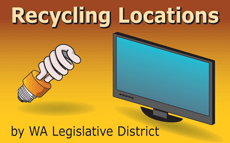Federal "Break Free from Plastic Pollution Act" introduced
In February 2020, U.S. Senator Tom Udall (D-N.M.) and U.S. Representative Alan Lowenthal (D-Calif.) unveiled their comprehensive legislation to tackle the plastic waste crisis, the Break Free From Plastic Pollution Act of 2020.
The Act "will provide badly-needed national leadership – reducing the amount of wasteful plastic and reforming our broken waste and recycling collection system. It will shift the burden of cleanup to where it belongs – to the corporations that produce this waste." The Act would:
- Require big corporations take responsibility for their pollution, requiring producers of plastic products to design, manage, and finance waste and recycling programs.
- Spur innovation, incentivizing big corporations to make reusable products and items that can actually be recycled.
- Create a nationwide beverage container refund program, which is successful at the state level.
- Reduce and ban certain single-use plastic products that are not recyclable.
- Establish minimum recycled content requirements for beverage containers, packaging, and food-service products, while standardizing recycling and composting labeling.
- Spur massive investments in U.S. domestic recycling and composting infrastructure, while pressing pause on new plastic facilities until critical environment and health protections are put in place.
The legislation's announcement garnered positive press from The New York Times, Rolling Stone, National Geographic, Time and Resource Recycling.
In April, The Intercept quoted Senator Udall saying,"By asking for a billion-dollar handout, Big Plastic is trying to maintain what already is the status quo: that is, taxpayers funding and taking responsibility for the waste of plastic producers. When we surface from this pandemic, plastic pollution will still be at crisis levels — and matters may be even worse, as industry tries to exploit this pandemic to leverage more marketing for single-use products."
"Udall was referring to recent attempts by the plastic industry to use the coronavirus crisis as a justification for rolling back bans on plastic bags and producing more single-use products. In March, the Plastics Industry Association wrote to the secretary of Health and Human Services, Alex Azar, asking him to “make a public statement on the health and safety benefits seen in single-use plastics.” The group also supplied its member companies with form letters requesting that their businesses that make single-use plastics, including packaging, be deemed essential."
